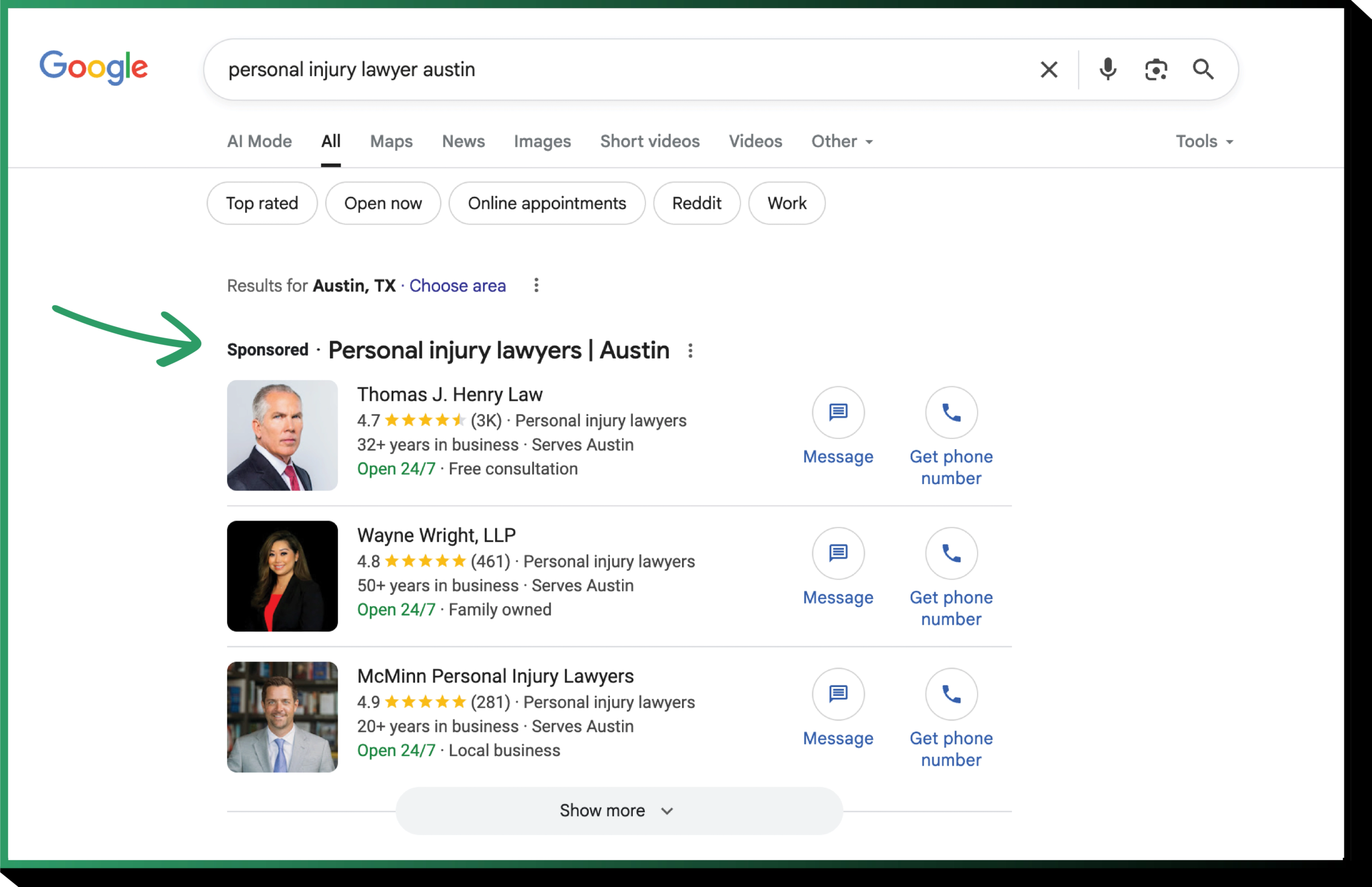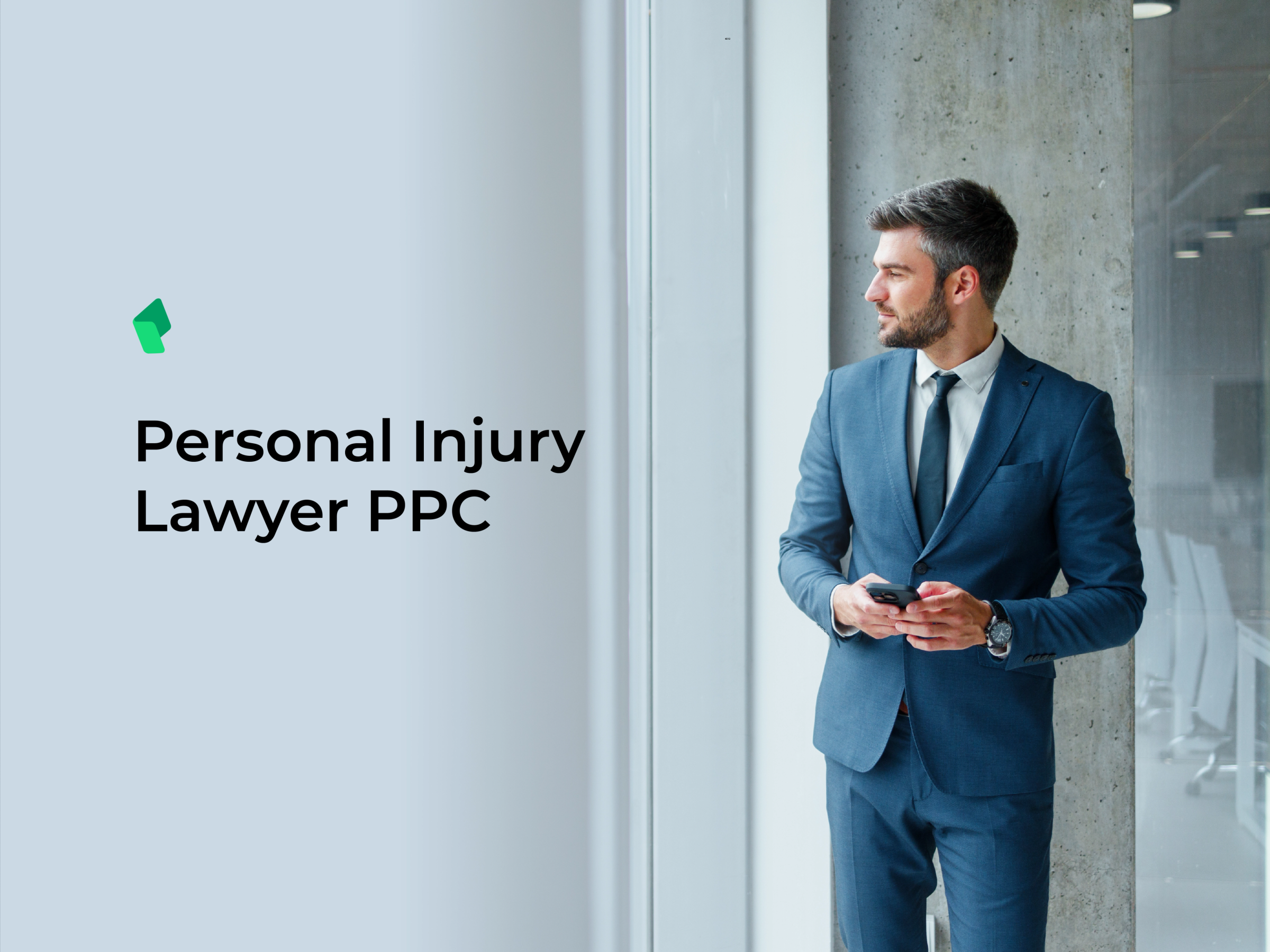As a personal injury law firm owner, you face fierce competition, ever-rising lead costs, and the constant challenge of proving your marketing ROI. While various channels exist for pay-per-click (PPC), the most impactful for lawyers is often paid search through platforms like Google.
Personal injury pay-per-click (PPC) marketing offers a powerful solution, enabling rapid client acquisition. However, this opportunity comes with a risk: fast growth is only sustainable if your intake process is airtight.
This guide will equip you with essential strategies—from budgeting and targeting to copywriting, landing page optimization, and lead management—to turn ad clicks into signed clients.
What Is PPC for Personal Injury Lawyers?
PPC, or pay-per-click, is an online advertising model where advertisers pay a fee each time someone clicks their ad. While PPC can appear in many formats—including emails, social media, and banner ads—the most common form is paid search through Google. Because of this, we’ll focus primarily on how to leverage PPC for search engines.
In the personal injury law landscape, PPC involves creating and managing online ad campaigns to attract potential clients searching for legal help after an accident or injury. These ads appear at the top of search engine results pages (like Google) when users search for relevant terms, such as "personal injury lawyer near me" or "car accident attorney."
Firms rely on PPC for personal injury lawyers to generate high-intent leads quickly, making it a critical component of a successful digital marketing strategy.
Why PPC Still Works in the Competitive Personal Injury Space
Organic search is more competitive than ever, causing many firms to prioritize both personal injury SEO and paid advertising on Google and other search engines. Despite rising ad costs, PPC remains one of the most effective personal injury marketing strategies to get your website to the top of Google.
Unless they already have a trusted referral or personal connection, most people start their search for a personal injury lawyer on Google. Running PPC ads can help your firm appear at the top of those search results instantly, giving you a competitive edge when potential clients are actively looking. While SEO strategy focuses on optimizing websites and leveraging marketing content to earn high Google rankings, PCC can help law firms get to the top of relevant search results quicker.
PPC advertising provides immediate visibility and a direct channel to connect with potential personal injury clients who have urgent needs. This blend of immediate impact and sustained growth makes personal injury lawyer ads an indispensable tool for firms looking to expand their reach and caseload efficiently.

How Much Does PPC Marketing Cost for Personal Injury Lawyers?
Effective budgeting for personal injury PPC requires understanding common cost metrics. Cost-per-click (CPC), cost-per-lead (CPL), and cost-per-acquisition (CPA) vary greatly by location and competition.
According to the National Law Review, CPCs related to personal injury law typically range from $70 to $250, making it one of the most expensive advertising spends. A single lead (CPL) can cost $300-$1,000, with client acquisition (CPA) often running into thousands ($2,500-$3,000).
Monthly budgets can range drastically from a few thousand dollars for small campaigns to over $10,000 for aggressive efforts. However, without a robust system to track, manage, and follow up, these figures become wasted ad spend. It's critical to nurture and convert leads to maximize your personal injury lawyer ads ROI.
Personal Injury Keyword Costs
Individual keyword costs fluctuate widely. High-value terms like "accident lawyer New York" command higher CPCs due to their strong commercial intent. Conversely, generic terms are cheaper but often attract less qualified leads. Strategic keyword selection is paramount to optimize ad spend and target prospects ready to engage.
Hiring a PPC Agency vs. Managing In-House
When considering PPC marketing, firms can either outsource to a dedicated personal injury PPC agency or manage campaigns internally.
Agencies offer specialized expertise, advanced tools, and scalability, freeing your internal team to focus on other tasks. The caveat is that working with a personal injury PPC agency often comes with higher upfront costs and less direct control.
In-house management, on the other hand, provides maximum control. It can also be significantly more cost-effective if you possess the right internal talent. However, effective personal injury PPC management demands significant time, knowledge, and access to costly tools. Without adequate bandwidth or experience, internal campaigns can quickly become inefficient.
Ultimately, opting for a personal injury PPC agency is often ideal if your firm lacks in-house expertise or needs fast growth. Whether or not your team uses an agency or runs ads in-house, utilizing lead management tools like CASEpeer can help your firm acquire more clients.
How to Get Started With PPC
Getting started with personal injury attorney advertising requires a few foundational steps. Here are the most important:
Basic setup: Begin by creating a Google Ads account. Next, set a realistic budget that aligns with your financial capacity and campaign goals. Your goals should be directly tied to personal injury lead generation, such as calls, form submissions, or specific case types.
Prepare intake infrastructure: Before activating any ads, it's crucial to prepare your intake infrastructure. This means ensuring your CRM is ready to capture, organize, and allow for immediate follow-up with new leads. A seamless intake process prevents valuable ad clicks from turning into missed opportunities.
Perform keyword research: Prioritize keywords that signal high intent over mere search volume. Tools like Google Keyword Planner or Semrush can help identify terms that indicate a user is actively seeking legal representation.
Tips for Managing PPC Campaigns for Personal Injury Firms
Personal injury PPC management can be expensive and competitive; therefore, a well-defined strategy is crucial. Here are some tips to optimize your entire system, from initial targeting to final intake:
Match Campaign Goals to Intake Capabilities
Choose your campaign goals based on your intake team's capacity. Chasing high volumes of leads without the internal readiness to process them efficiently will lead to wasted ad spend and missed opportunities. Align your PPC investment with your firm's ability to convert leads into signed clients.
Use Keywords That Signal Client Readiness
Focus on intent-based targeting. Prioritize bottom-of-funnel keywords that signal immediate action, such as "car accident lawyer near me." These terms indicate a potential client is ready to engage, as opposed to broader terms that suggest they’re just doing preliminary research.
Develop Messaging That Reinforces Trust
Your ad copy should actively build credibility and trust. Use social proof (e.g., "5-star rated"), highlight clear results (e.g., "millions recovered"), and provide concise, compelling calls to action. Utilizing tools like ChatGPT for legal marketing can help you create clear and trustworthy messaging that reduces hesitation and encourages clicks.
Segment by Case Type, Geography, and Language
Segmentation is key. Run separate campaigns for distinct case types (e.g., truck accidents vs. slip-and-falls) in the cities you want to tailor advertising. Geo-target specific regions, and if applicable, create separate campaigns for different languages to maximize relevance and conversion.
Track Real-Time Results and Filter Lead Quality
Emphasize ongoing lead evaluation. Tools like CASEpeer can help identify low-quality leads, pinpoint top-performing sources, and improve intake prioritization. Real-time tracking allows you to make adjustments to your PPC campaigns, ensuring your budget is allocated effectively to qualified prospects.
Avoid Budget-Wasting Mistakes
Be mindful of common and costly errors in personal injury attorney advertising. These include bidding on overly generic keywords (like “lawyer near me”) that attract unqualified traffic unrelated to your services. Other mistakes include neglecting negative keywords (which prevent your ads from showing for irrelevant searches) and failing to optimize your landing pages and ads for mobile users, where a significant portion of searches occur.
Common Challenges With Managing Personal Injury Leads
Even with expertly managed personal injury lawyer ads, firms often face challenges in lead management, which can undermine their PPC efforts. Here are some of the most common:
Missed follow-ups: Leads generated through PPC are often urgent. Delays in follow-up can result in potential clients moving on to competitors.
Disorganized tracking: Without a centralized system, tracking lead sources, communication history, and qualification status becomes chaotic, making it difficult to assess the effectiveness of your campaigns.
Manual intake bottlenecks: Relying on manual processes for intake creates bottlenecks that slow down conversion and lead to a poor client experience.
Poor lead qualification wastes marketing budget. When unqualified leads consume valuable intake team time, it diverts resources from genuinely promising prospects. Furthermore, identifying top-performing sources without proper attribution is nearly impossible, preventing data-driven optimization of your personal injury PPC campaigns.
CASEpeer offers a powerful solution to these challenges, centralizing intake, automating routine tasks, and providing analytics to track conversion trends and identify high-value leads.
Manage Personal Injury Leads Better With CASEpeer
PPC is not a gamble, but an investment designed to yield returns. Before scaling your personal injury PPC efforts, it’s highly recommended that legal marketers audit their current intake systems. An efficient, streamlined intake process is the backbone of successful paid advertising, ensuring that every valuable lead is nurtured effectively.
CASEpeer is the CRM built for high-volume personal injury firms. It provides the tools necessary to centralize your lead management, automate follow-up, and gain critical insights into your PPC performance, transforming ad clicks into signed clients.
Book a demo today to discover how CASEpeer’s PPC intake and lead management tools can optimize your firm's advertising ROI and streamline your client acquisition.
About the author
Gabriela is a creative and results-driven SEO specialist dedicated to helping small businesses and professional service firms excel online. She leverages over six years of digital marketing experience to provide in-depth, authoritative content required for regulated industries like accounting and legal technology. Her work focuses on bridging complex financial and compliance topics with clear, actionable guidance. The core aim of her content is to deliver compliant, data-driven strategies that help practitioners streamline their operations, maximize firm cash flow, and grow their online presence.

